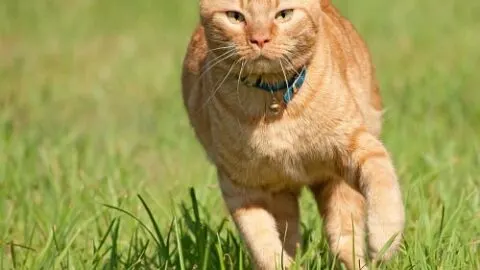 If you have a playful cat, you’ve probably been there. You’re interacting with your cat like normal, and then all of a sudden, they freeze for a second and then suddenly jump up and dart away from you. Your cat might even have meowed at you or complained that you didn’t follow. This kind of behavior begs a natural question: do cats like being chased?
If you have a playful cat, you’ve probably been there. You’re interacting with your cat like normal, and then all of a sudden, they freeze for a second and then suddenly jump up and dart away from you. Your cat might even have meowed at you or complained that you didn’t follow. This kind of behavior begs a natural question: do cats like being chased?
Cats like being chased. Some cats enjoy being playfully chased by their owners when treats are involved. Other cats might be intimidated by you chasing them aggressively as it can cause fear, anxiety, and bad connections to your pet.
Like a lot of cat behavior, this kind of play depends on your cat’s temperament, the kind of bond you have, and even their age and activity level. So, let’s dive in and learn a little more about why your cat may or may not want to play chase.
Why Do Cats Want You To Chase Them
Some cats enjoy playing chase. They might even try to ‘invite’ you to play chase with them by making eye contact and then dart away at top speed. Usually, you can tell if this is why your cat is suddenly zoomie if they stop a few feet away (or just in the next room) and start looking for you to play with them.
This is your cat saying that they want to play and are ready. Pausing and waiting for you to catch up is part of what makes this behavior playful. A scared or intimidated cat, or a cat that’s just playing by themselves, typically won’t stop to look for their owner. They’ll keep running until they’ve found a good hiding place or have tired themselves out.
The cats that enjoy playing chase with their owners might be treating you a little more like they would treat another cat, especially if they are an only-cat. Cats can be social with other cats from the same group, even in the wild. Chasing and play-fighting are two of the primary ways cats will play with one another, so it makes sense that your cat might try to extend those behaviors to their owners.
If your cat invites you to play chase, consider whether you want to start the game pretty carefully. Once you’ve played chase with your cat, they’ll likely think that chase is the normal social behavior and might get upset if you stop chasing them when they ask.
Should You Chase Your Cat
You should not chase your cat if they are uncomfortable or are easily scared.
This question is more complicated. Some cats enjoy playing chase with their owners; other cats don’t. Some owners enjoy playing chase with their cats; others don’t enjoy this game and would rather their cat didn’t play chase with them.
The first question you should ask is if your cat wants to be chased. A naturally anxious cat, or a rescued animal that might have a history of abuse or neglect, probably won’t enjoy playing chase no matter how much they love you.
A high-energy cat that’s closely bonded to you might think the chase is the best game ever.
Adapting to your cat’s wants and needs is incredibly important if you want to get this behavior right.
Is It Bad To Chase Your Cat
No, it is not bad to chase your cat if they are seeking this kind of attention. As long as it looks like your cat is enjoying playing chase, you’re fine to play chase with your cat. The only time it’s bad to play chase with your cat is when they aren’t enjoying it.
The last thing you want is for your cat to feel like you are intimidating or scary to them.
Assuming you’re paying attention to your cat’s social cues, Chase and other interactive games are perfectly fine. You may even want to play chase with the cats that are a little more reticent to help them develop more social skills and be more comfortable at home.
Of course, if you’re going to play chase with the cats, reticent to make sure you’re paying attention to them so that they’re not getting too anxious while you’re playing.
And as always, make sure you’re having fun too. Your cat will be able to tell if you aren’t enjoying the game, and it’ll make them less likely to enjoy it too.
Is It Okay To Play Chase With Your Cat
It’s okay if you want to play chase with your cat. Make sure your cats are interested in the game before you start, and make sure you’re aware of your cat’s mood and anxiety while you play. If your cat starts to get a little overwhelmed, it might start to see more aggressively. That’s a pretty good sign that it’s time to give your cat a break from playing chase.
Just because your cat got anxious once does it mean that you can’t keep playing chase. Monitor your cat and try to chase when they are a little calmer. Over time your cat will probably learn to enjoy the game more, and you’ll get better at identifying when they’re ready to stop.
Can You Play With Your Cat Too Much
Yes, it is possible to play with your cat too much. When it comes to playing with your cat, it can be hard to tell when it’s time to stop and when you’re cat might’ve had too much. Cats are designed to spend most of the day sleeping with periods of high energy and activity between naps. Spending too much time playing can prevent your cat from getting enough sleep and leave them irritable and more anxious.
Fortunately, most adult cats will stop playing when it’s time for them to stop. You have to be a little more careful with young adult cats because they are more prone to overplaying.
If your cat starts to show signs of overstimulation, like being anxious, irritable or getting more aggressive, it’s probably time to stop. If you’re playing a very physical game like chasing the string or playing chase, you should also watch for signs that your cat needs a break. Open-mouthed panting, especially if their trust is moving quite a bit, can be a sign that your cat is at their physical limits even if they are to their mental limit.
When this happens, take a short break, let your cat catch their breath, and see if they want to play in a minute or two.
Is It OK To Scare Your Cat
Generally, it is not okay to scare your cat, even for playful purposes.
Some cats benefit from being startled or scared occasionally because it helps lower their long-term stress and anxiety. When you startle or scare your cat over time, they learned that they don’t have to be frightened about the particular stimulus.
However, if your cat is already prone to anxiety and fear, it’s important to take this process slowly. Suppose your cat is naturally anxious there already seeing frightened by their environment and don’t need much external stimulation to do that. In those cases, it’s usually best to make sure your cat has somewhere they feel safe and not to try and scare or startle them until they’re more comfortable in your home.
Has your cat gets more comfortable, you might be able to speed things up with the occasional mild startle.
However, intentionally scaring your cat for a prolonged time is never a good idea. You can startle them, introduce them to new and potentially frightening objects, and other things that temporarily increase their anxiety. But anything that keeps them scared for more than a few seconds or minutes is probably too much.
You also want to be careful that you aren’t the scary thing. If you become frightening or anxiety-producing to your cat, it’s going to take a lot of work to undo that. Since most cat owners want a loving companion, we don’t recommend scaring your cat too often or too much; they won’t bond with you correctly if you do.
Things To Consider
Playing chase with your cat can be a fun way for both of you to get a little more exercise at home. However, it can go too far, and your cat may pick up behaviors that aren’t healthy for you or your cat. If your cat starts to get aggressive every time you play chase, it’s probably time to find a new game. Ideally, your cat should have good quality control and never try to bite you while you’re playing.
Of course, the ideal can be hard to achieve, so don’t be too worried if you get the occasional scratch for a mild nip.
One of the best ways to teach good human play behavior is to stop playing when your cat does something you don’t want them to. If your cat accidentally scratches you, stop playing for a couple of minutes. If your bites you, stop playing entirely. You can go back to play anywhere from half an hour to an hour later, and your cat will still get the message that biting is unacceptable and not play behavior.
If you want these rules to stick, you have to be consistent in enforcing them. Even if you’re still having fun after an accidental scratch or bite, continuing to play teaches your cat that that’s acceptable play behavior with you. While it might not be a big deal this time, you never know what the next time could look like. Discipline, for both you and your cats, is critical to make games like chase safe and fun for everyone.
You should also know that cat behavior can differ between different people your cat interacts with. While your cat might have good claw etiquette with you, that doesn’t mean they’ll have good claw etiquette for your other family members or friends.
If you want your cat to have good claw and bite etiquette with everyone, you’ll need to have some help from friends and family members who know the rules. Teaching your cat that the rules are the same for everyone as early as possible is the best way to make sure your cat has good behavior with every human they meet.

My name is James, and welcome to FAQCats!
Along with our team of cat owners, expert pet enthusiasts, and pet professionals, we aim to write engaging helpful, engaging content about cats. At FAQCats we strive to provide content that’s accurate and fun to read. Our team writes about everything related to cats; even the most complex of topics. Through extensive research and caring for our own fur-pals, we’re able to provide something cat owners worldwide will love. Have a look around, and leave us feedback anytime!

